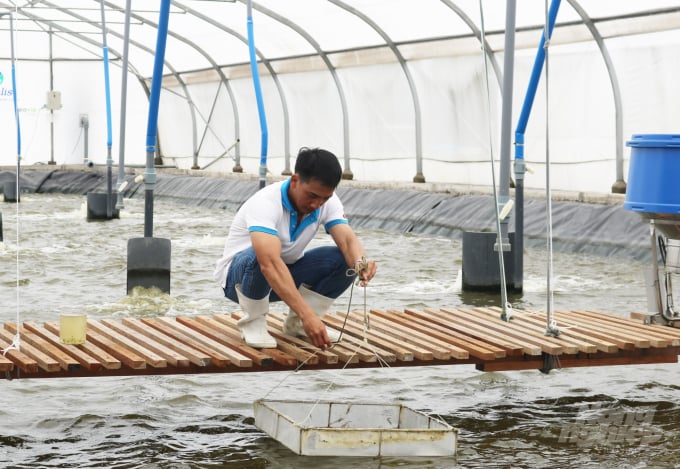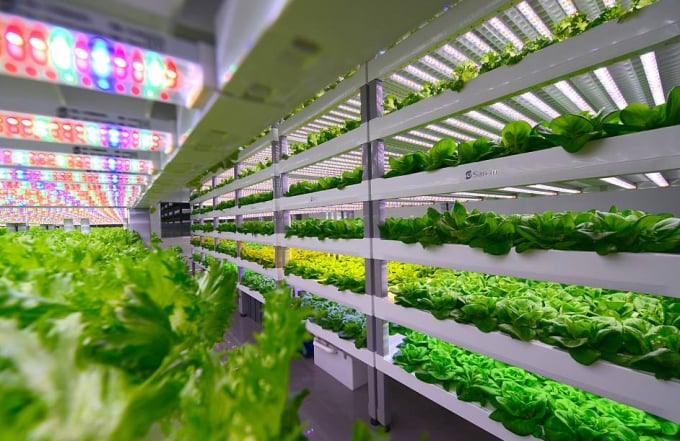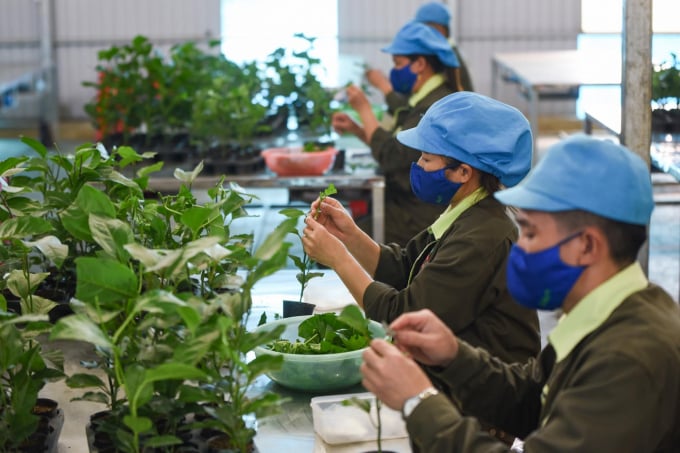November 27, 2025 | 16:36 GMT +7
November 27, 2025 | 16:36 GMT +7
Hotline: 0913.378.918
November 27, 2025 | 16:36 GMT +7
Hotline: 0913.378.918
According to the Vietnam Digital Agriculture Overview Report 2021 developed by the Department of Science, Technology and Environment (Ministry of Agriculture and Rural Development) and the Vietnam Digital Agriculture Association (VIDA), increased studies and applications of digital technology and more active digital transformation in agriculture created great values and foundations for big changes in the sector.

Digital technology is used widely in aquaculture production. Photo: Thanh Son.
In cultivation, Internet of Things (IoT), Big Data, artificial intelligence (AI), robotics and sensors have been applied through digital technology products such as software that allow analyzing data about the environment, genetic resources, plants and plant growth stages, consumers can track these parameters in real-time.
In 2016, Vietnam had only one company working on electronic traceability but now, many companies are studying, developing and applying new technologies such as Blockchain in traceability.
IoT, blockchain and biotechnology are applied in large-scale livestock farms. Modern cow farms of TH True Milk and Vinamilk are vivid examples for effective application of digital
In forestry, the application of barcode technology in forest varieties and forestry products management. Geographic information systems and remote sensing images are used to develop programmes for early detection and warning of forest fires from satellite images, programmes for monitoring and early detecting deforestation and forest degradation.
In fisheries, digital transformation is seen in the use of ultrasonic fish detectors, flow meters, satellite phones, catch-drop net capture system, GIS and GPS technology to help manage the offshore fishing fleet.
Recirculating aquaculture systems – RAS, biofloc technology, and nanotechnology are also used increasingly in aquaculture. Artificial intelligence technology has been used in shrimp farming to analyze water quality data, feed management and shrimp health.
Automation technology has been widely applied in seafood processing, from sorting, steaming, packaging, production lines, helping reduce production costs and ensure product quality.
Agriculture enterprises have been very active in seeking opportunities and technology to meet the consumers’ requirements of transparency in the process of incubation, cultivation, harvesting, processing, preservation and logistics.
Digital transformation in Vietnam’s agriculture is still lagged behind those in other countries in the Asian region. For example, China for a long time invested intensively in digital transformation and now, it was boosting digitalised agriculture in rural areas. It developed data collecting systems, integrated digital technology with production and management systems and increase farmers’ digital skills.

A smart vegetable farm in China. Photo: TL.
China is the only country that is applying AI in breeding to minimise risks. For examples, AI helps detect unusual signals of a single pig through its temperature, sound of its cough to make a diagnosis based on available database and then, inform farmers.
Thailand implemented digital transformation “from farm to table”, paid great attention to digital technologies like sensors, image analysis, farm management software programmes, AI and robotics to optimise the operation of factories, increase productivity and production.
Farmers could observe, oversee and control the production process exactly.
Nguyen Manh Hung, Vice president of the Vietnam Digital Agriculture Association and Nafoods Group director-general said that many agricultural firms had been quietly implementing digital transformation.
Nafoods Group was speeding up applications of digitalisation in the value chain from seeds, nursing, processing and logistics.
“To promote digital transformation in the value chain, Nafoods launched a fishbone model. Accordingly, Nafoods only owns the fish head and backbone with the head is technology and data, the backbone consists of 4 vertebrae – seeds, growing, logistics and processing chain and consumption,” he said.
“For this model to be successful, a lot of "bones" are needed to plug into the "vertebrae" of Nafoods. Those "bones" are partners, farmers, employees, customers..., and they must all be entitled to commensurate value,” he added.
For a successful digital transformation, it was necessary to industrialise agriculture production, turning farms into factories, he said, adding that Nafoods Group was developing standards so that every its passion fruit tree would be identical.

Workers examine passion fruit trees in Nafoods Group. Photo: Tung Dinh.
However, Hung said that digitalisation required input data that few enterprises could not make alone but also need the participation of many enterprises, ministries and agencies.
Nguyen Thi Thanh Thuc, Bagico chairwoman said that the Government played a main role to speed up digitalisation in agriculture and the State’s budget must be the main fund for the digitalisation.
Beneficiaries including enterprises and farmers also had to engage in the digital transformation, for example, when tens of millions of farmers provided relevant information, a giant database could be formed, she said.
Vo Quan Huy from Huy Long An Ltd Company said that when it turned cold in China early, more Vietnamese banana and watermelon were imported to the country at better prices. This meant if weather data was included in agriculture production thanks to digitalisation, Vietnam’s agriculture would benefit a lot.
/2025/11/27/3830-1-152901_403.jpg)
(VAN) Dong Nai is developing its key crop areas, expanding planting area codes, and applying high technology to increase the value of agricultural products, aiming at a green and sustainable agriculture.

(VAN) Tay Ninh’s livestock sector is undergoing a major transformation, applying high-tech, closed-loop circular models to build sustainable value chains.
/2025/11/26/3627-4-082628_818.jpg)
(VAN) From a small café on the red basalt highlands, Le Van Hoang started a business with clean coffee, building Enjoi Coffee into a symbol of organic agriculture in the Lam Dong plateau.
/2025/11/25/0045-1-135246_13.jpg)
(VAN) Ca Mau is researching a model of sea-encroaching embankments combined with viaducts and logistics service zones, aiming both to prevent erosion and create land funds for marine economic development.

(VAN) The information was shared at the seminar 'Urban Agriculture - Solutions for Developing Green Spaces,' organized by the Kinh te & Do thi Newspaper and the Biotechnology Center of Ho Chi Minh City.
/2025/11/19/4141-2-132831_216.jpg)
(VAN) One of Japfa's outstanding solutions is implementing digital transformation and artificial intelligence (AI) to optimize operations, enhance productivity, and advance sustainable development.
/2025/11/19/4847-1-093540_448.jpg)
(VAN) The Gia Lai Provincial People’s Committee had a working session with the delegation of the U.S. Department of Agriculture, the State of Idaho, and representatives of the State's leading enterprises.